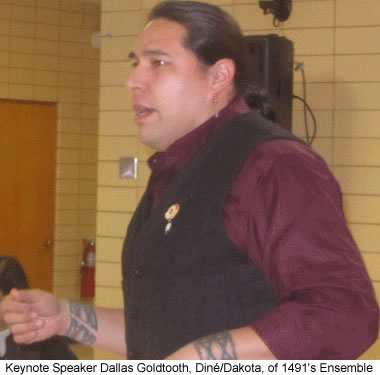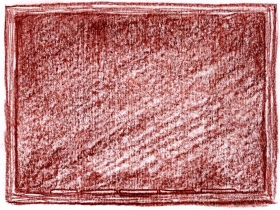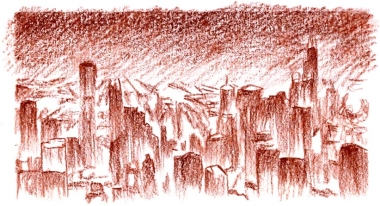 |
Canku Ota
|
 |
|
(Many Paths)
|
||
|
An Online Newsletter
Celebrating Native America
|
||
|
March
2013 - Volume 11 Number 3
|
||
|
|
||
|
Chicago American
Indians Celebrate the Writers' Group
"Chi-Noodin" – We Write for Ourselves |
||
|
by Levi Rickert - Native
News Network, editor-in-chief in Native Currents
|
||
|
credits: illustrations
by Monica Whitepigeon
|
|
CHICAGO – Several Chicago American Indian families spent this past Sunday afternoon enjoying each other's company at the Chicago Public Schools T7 American Indian Education Program's "Festival of Stories and Public Forum."
The staff of the T7 American Indian Education Program took an opportunity to make a presentation on the various activities they offer American Indian students who attend the Chicago Public Schools. Among the activities are: the running club, tutoring program, American Indian speakers bureau, college and career guidance, book club, among others. Presentations were made by the program's staff: Jolene Aleck, Paiute, program manager; Lisa Bernal, Lakota, home/school coordinator; Maria Guzman, Stockbridge Munsee, data specialist; Monica Rickert, Potawatomi, public relations consultant; and Debra Yepa-Pappan, Jemez Pueblo, youth development coordinator. Each provided an overview of their responsibilities to the success of the program. D'Wayne Begay, Navajo, of the United States Tennis Association gave a presentation on the value of tennis in his life. He was there in hopes of attracting American Indian youth interest in taking up tennis a sport. The keynote speaker for the event was Dallas Goldtooth, Dine/Dakota, of the 1491's ensemble. 1491's is a ragtag of American Indian filmmakers, actors and comedians who make satirical short films. The films are meant to be humorous, while at the same time they encourage the viewer to find a deeper meaning behind the film. Goldtooth spent much of his time showing some of 1491's work. Among the popular on Sunday that drew huge laughter were: "Slapping Medicine Man," and "Singing Lessons." The Native News Network is proud to republish two of the short entries from this year's "Chi-Noodin" Mistaken Identity
This is just one incident out of many where my identity was mistaken. One time some "Mexican" elders were trying to talk to me in Spanish. I told them, "I apologize but I do not speak Spanish." Then one of the women broker out in English talking to the others saying, "Oh these kids today don't even know their language.' Then I stepped into their circle and told her, "Spanish isn't my language nor is it yours. I am Native American. I speak English because my people were taken over by them, and you speak Spanish because your people were taken over by the Spaniards." I am not Hispanic but my "cousins" are: we are all related and some closer than others. Imaginary lines in our minds and on the maps are what separate us. Hispanics think I look like them and sometimes I think they look like me, but the reflection inside is what really matters. Urban Raised
I like to go back "home" to Jemez. Only there can I see the entire expanse of the sky, the mesas and mountains making up the horizons, the turkey vultures flying overhead, and the coyotes crying in the distance. At night, it is darker than dark and ever so quiet except for the occasional rez dog barking at something only it can see. I'm afraid of the dark; I miss my orange city lights. Only when the sky begins to lighten do I feel safe. My daughter Ji Hae was born in Chicago. She is being raised there. She is a city girl through and through. She's more diverse than I am, made up of two parents of many cultures. She loves the city. Diversity is natural to her. But unlike me, she would go camping in a heartbeat if asked. She loves nature hikes and being out in the woods walking on wet, muddy trails. We've picked up the tradition of going to Jemez once a year. I can tell Ji Hae feels right at home when we're there. We take our drive to the mountains, to the place where we had spread my father's ashes. We love it up there! We're at peace and feel like we're with my dad. There's hardly ever anyone else there. The air is cool and crisp. It's quiet except for the sound of the running stream and the occasional little bird squawking at us if we get too close to the tree where it it's nest is. We talk to the bird to reassure it that we're not there to bring it harm as we move along our way. Ji Hae loves it there. I think she feels her grandfather's presence. We make it back to the village before it gets dark, because like me, Ji Hae is afraid of the dark too. I think she misses her orange city lights. |
|
|
||
|
|
||
| Canku Ota is a free Newsletter celebrating Native America, its traditions and accomplishments . We do not provide subscriber or visitor names to anyone. Some articles presented in Canku Ota may contain copyright material. We have received appropriate permissions for republishing any articles. Material appearing here is distributed without profit or monetary gain to those who have expressed an interest. This is in accordance with Title 17 U.S.C. Section 107. | ||
|
Canku Ota is a copyright ©
2000 - 2013 of Vicki Williams Barry and Paul Barry.
|
||
 |
 |
|
|
The "Canku
Ota - A Newsletter Celebrating Native America" web site and
its design is the
|
||
|
Copyright ©
1999 - 2013 of Paul C. Barry.
|
||
|
All Rights Reserved.
|
||
 The
second edition of "Chi-Noodin" - or "We Write for Ourselves" was
released at the event. The booklet is filled with articles written
by an American Indian writers group. Comprised of Chicago American
Indians, the writers group releases short writings that depict their
living in the urban setting of Chicago.
The
second edition of "Chi-Noodin" - or "We Write for Ourselves" was
released at the event. The booklet is filled with articles written
by an American Indian writers group. Comprised of Chicago American
Indians, the writers group releases short writings that depict their
living in the urban setting of Chicago. When
I was a little girl in the first grade I was put in bilingual class.
I remember not understanding my teacher or the students. The teacher
thought I was a mute in the beginning. Then the day came when I
had to have a parent-teacher conference. My grandmother couldn't
make it so my neighbor, also my babysitter, went in her place. First
thing that came out of my teacher's mouth was, "She does her work
but she doesn't talk or seem to listen." My babysitter laughed and
said, "Because she doesn't speak Spanish. She is Native American."
Then my teacher broke out into laughter. I moved to my new English
speaking multi-cultural class shortly after the meeting.
When
I was a little girl in the first grade I was put in bilingual class.
I remember not understanding my teacher or the students. The teacher
thought I was a mute in the beginning. Then the day came when I
had to have a parent-teacher conference. My grandmother couldn't
make it so my neighbor, also my babysitter, went in her place. First
thing that came out of my teacher's mouth was, "She does her work
but she doesn't talk or seem to listen." My babysitter laughed and
said, "Because she doesn't speak Spanish. She is Native American."
Then my teacher broke out into laughter. I moved to my new English
speaking multi-cultural class shortly after the meeting. I
was not born in Chicago but I was raised here, in the city. I'm
a city girl to the bone. Don't ask me to go camping, because I will
not. I love the city for all its diversity and culture. I am diverse.
But all this is not to say I don't enjoy visiting the woods, the
country, or the mountains. I love the mountains and it's the Jemez
Mountains I love the most. If it weren't for the family trips to
Jemez when I was a kid, I don't know if I would appreciate someplace
other than Chicago.
I
was not born in Chicago but I was raised here, in the city. I'm
a city girl to the bone. Don't ask me to go camping, because I will
not. I love the city for all its diversity and culture. I am diverse.
But all this is not to say I don't enjoy visiting the woods, the
country, or the mountains. I love the mountains and it's the Jemez
Mountains I love the most. If it weren't for the family trips to
Jemez when I was a kid, I don't know if I would appreciate someplace
other than Chicago.